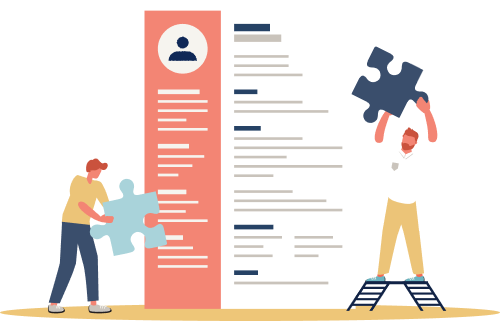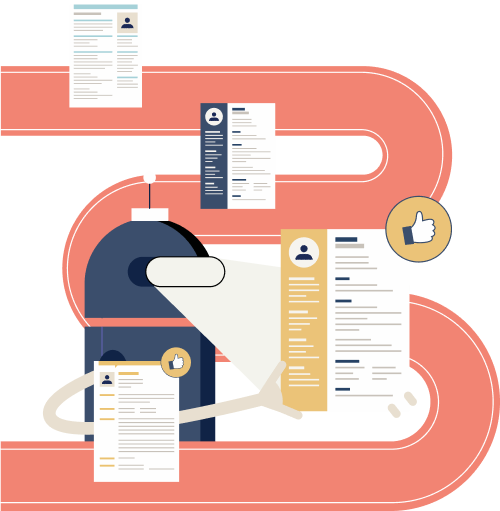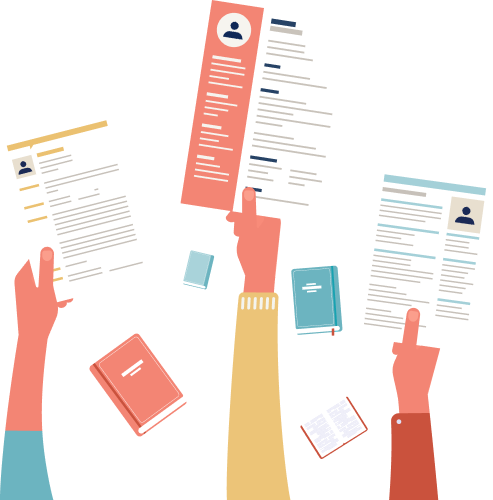25 Common Interview Questions and Answers
I’ve compiled 25 of the most common job interview questions, along with clear, tailored answers, to help you feel more confident and make a strong impression.


Our customers have been hired by: *Foot Note
For every job opening in the UK, a high number of candidates apply, yet only a handful are invited to interview. That means once you’ve landed the interview, preparation is critical. It’s your chance to stand out, show confidence, and prove you’re the right fit for the role.
In this guide, I’ll walk you through 25 of the most common interview questions, complete with example answers that help you make a strong impression. I’ll also cover sample interview questions tailored to specific roles like teachers, developers, and NHS staff. Still trying to get that interview? Use our CV builder to create a strong, job-ready CV that gets noticed.
25 Typical interview questions (and how to answer them)

Recruiters often rely on a core set of interview questions to assess whether you’re the right fit for the role. Below, I explain why each question is asked, what the interviewer is really looking for, and how to answer effectively.
1. Tell me about yourself
Why they ask it: This is often the first question in a phone interview. It helps the interviewer break the ice and gives them a quick overview of your background. They want to see how clearly and confidently you can talk about your career path, your motivations, and how well you align with the role.
What they’re looking for: A clear, confident introduction that links your past experience to the job you’re applying for. They’re assessing your communication skills, professionalism, and ability to focus on what matters most to the position.
Sample answer:
“Hi, thank you for the opportunity to speak today. I’m a marketing specialist with around five years’ experience, mainly focused on digital campaigns for e-commerce and retail brands. I really enjoy analysing customer data and using it to shape creative strategy. In my last role, I led a campaign that increased online sales by 20% in just three months. I believe my background and skills match the requirements for the job, and I’d be happy to go into more detail about my previous roles.”
2. What are your greatest strengths?
Why they ask it: Interviewers want to see if your skills and qualities match the role’s requirements. This interview question also gauges your self-awareness and confidence.
What they’re looking for: Specific strengths relevant to the job, supported by examples. They want to see that you understand what the role demands and that you have the qualities to succeed.
Sample answer:
“One of my greatest strengths is my attention to detail. In my previous role as a project coordinator, this helped me catch errors early and keep projects on track. I’m also very organised, which allows me to manage multiple deadlines efficiently. I believe these skills would be valuable in this role, where managing complex schedules is crucial.”
3. What is your greatest weakness?
Why they ask it: This common interview question tests your honesty and ability to reflect on areas for improvement. It also shows how you handle challenges.
What they’re looking for: A genuine weakness that isn’t a core skill for the job, paired with steps you’re taking to improve it. They want to see that you are proactive and committed to growth.
Sample answer:
“I sometimes struggle with delegating tasks because I want to ensure everything is perfect. However, I’ve been working on trusting my team more and have seen positive results by giving others more responsibility. This has improved our overall efficiency.”
4. Why do you want to work here?
Why they ask it: Interviewers want to know if you’ve researched the company and are genuinely interested. This interview question also reveals your motivations and values.
What they’re looking for: A thoughtful answer showing alignment between your goals and the company’s mission or culture. They want to see enthusiasm and fit.
Sample answer:
“I’m impressed by your company’s commitment to sustainability and innovation. These values are important to me personally, and I’m excited about the opportunity to contribute to projects that make a real impact. I also admire your collaborative team culture, which I thrive in.”
5. Describe a challenge you faced at work and how you dealt with it.
Why they ask it: This question assesses problem-solving skills, resilience, and your ability to learn from difficult situations.
What they’re looking for: Clear examples that show how you approach challenges constructively and effectively. They want to see you stay calm under pressure and find solutions.
Sample answer:
“In my previous role, we faced a sudden shortage of staff during a critical project phase. I organised the remaining team, prioritised tasks, and communicated closely with stakeholders to manage expectations. By adapting quickly and working together, we delivered the project on time despite the challenge.”
6. Why should we hire you?
Why they ask it: This interview question gives you a chance to sell yourself and highlight what sets you apart from other candidates. With an average of 49 applicants per job in the UK, employers want to know why you stand out from the crowd.
What they’re looking for: A confident and relevant summary of your work experience, skills, and achievements that align with the role. They want to see what value you’ll bring to the company and why you’re the best fit. Including concrete results, such as percentages, targets met, or process improvements, helps prove your impact.
Sample answer:
“I bring over five years of experience in customer service, with a proven track record of improving client satisfaction scores by 15% year-on-year. I’m passionate about helping customers and consistently look for ways to streamline service processes. I believe my combination of technical knowledge, communication skills, and dedication makes me a strong asset for your team.”
7. Where do you see yourself in five years?
Why they ask it: This question helps employers understand your career goals and whether you plan to stay and grow with the company.
What they’re looking for: Ambition and planning, but also realism. They want to see that your goals align with what the role and company can offer long-term.
Sample answer:
“In five years, I hope to take on more responsibility in a leadership role. I’m interested in developing my skills further, possibly mentoring junior colleagues or leading a small team. I see this position as a great stepping stone to grow professionally within your company.”
8. Why did you leave your last job?
Why they ask it: This interview question helps employers understand your motivations and whether there were any red flags in your previous employment.
What they’re looking for: An honest but tactful answer. They want to see professionalism and that you left for the right reasons, such as growth, new challenges, or alignment with your career path.
Sample answer:
“I enjoyed my time at my last job, but after three years, I felt ready for a new challenge and opportunities to grow. I’m looking for a role where I can expand my skills and take on greater responsibility, and I believe this position aligns well with those goals.”
9. Describe a situation where you collaborated with a team.
Why they ask it: Teamwork is crucial in most roles. Employers want to see that you can collaborate effectively, contribute positively to group effort and have the necessary soft skills.
What they’re looking for: Evidence that you are a team player, can communicate clearly, and handle different personalities. They want a real example that shows how you support and adapt in team settings.
Sample answer:
“During a marketing campaign, I worked closely with a cross-functional team including designers, content writers, and sales reps. We faced a tight deadline, so I organised weekly check-ins and shared a progress tracker to keep everyone aligned. The result was a campaign that launched on time and exceeded our lead generation targets.”
10. How do you handle stressful situations?
Why they ask it: Employers want to know how you perform under stress and whether you can stay productive during tough times.
What they’re looking for: Examples of coping strategies and a calm, thoughtful approach. They want to see resilience and the ability to maintain performance under pressure.
Sample answer:
“I stay calm by breaking tasks down into smaller, manageable parts and prioritising what needs immediate attention. For example, during a system outage at my previous job, I focused on clear communication and worked closely with the tech team to resolve the issue while keeping customers updated. This approach helped reduce stress for the team and maintain customer trust.”
11. Why would you like to work for this company?
Why they ask: Interviewers want to see if you’ve researched the company and if your motivations align with what they offer. This shows genuine interest and helps them predict how well you’ll fit.
What they’re looking for: They want someone who not only understands the role but also values what the company uniquely provides, whether that’s culture, benefits, or growth opportunities.
Sample answer:
“I’m keen on this role because I admire your company’s strong commitment to sustainability and community engagement. For example, your recent partnership with local environmental charities really stands out to me. Being part of a company that prioritises social responsibility aligns with my personal values and motivates me to contribute beyond just my day-to-day tasks.”
12. How do you handle working under pressure?
Why they ask it: Employers use this interview question to assess your ability to remain calm, focused, and effective when deadlines are tight or workloads are high.
What they’re looking for: Examples of how you’ve stayed productive in stressful situations. They want to see that you have coping strategies and can manage your tasks professionally.
Sample answer:
“I find that staying organised helps me manage pressure. In my previous role, I had to manage multiple urgent client requests simultaneously. I prioritised tasks based on urgency, communicated clearly with the team, and kept the clients updated. Everything was delivered on time, and the clients were satisfied.”
13. Describe a difficult situation at work and how you handled it.
Why they ask it: This common interview question assesses your problem-solving ability, communication skills, and emotional intelligence in challenging circumstances.
What they’re looking for: A clear, structured response that shows how you handled the situation professionally. They want to see you stay calm and find a solution.
Sample answer:
“A client once became upset over a delay caused by a supplier. I listened to their concerns, explained the situation honestly, and offered a discount as a goodwill gesture. I also worked with our logistics team to prevent similar issues in future. The client appreciated the transparency and stayed with us.”
14. How do you prioritise your work?
Why they ask it: Time management is crucial. Interviewers want to know how you stay organised and focused when juggling multiple tasks.
What they’re looking for: A logical system for prioritising tasks, such as using to-do lists or digital tools. They want evidence that you meet deadlines without getting overwhelmed. This shows you’re reliable and efficient under pressure.
Sample answer:
“I start by identifying urgent and important tasks, then break them down into smaller steps. I use a task management tool to stay on top of deadlines and regularly reassess priorities throughout the week. This helps me stay focused and productive.”
15. How do you stay organised?
Why they ask it: Similarly to the previous one, this interview question tests your time management, task prioritisation, and attention to detail, which are critical in roles that require multiple responsibilities (which are most roles!)
What they’re looking for: They want to see if you use effective tools or systems, how you handle busy workloads, and if you can meet deadlines consistently without missing details.
Sample answer:
“I rely on a combination of digital tools and structured planning. I use Trello to track tasks and Google Calendar for time blocking. Each morning, I review priorities and adjust based on deadlines. This helps me stay on top of projects and ensures that nothing gets missed”
16. Describe a time you received constructive criticism. How did you respond?
Why they ask it: Interviewers want to assess how well you accept feedback and whether you can learn and grow from it.
What they’re looking for: They want to see maturity, self-awareness, and a willingness to improve. Being defensive and unable to handle constructive criticism positively is seen as a red flag.
Sample answer:
“In a previous role, my manager pointed out that I was too focused on getting tasks done quickly and occasionally missed small details. I appreciated the feedback and started using a checklist system for quality control. It really helped me catch errors before submission, and I even shared the system with colleagues.”
17. What are you passionate about?
Why they ask it: This helps employers get a sense of your values, what motivates you, and how well you might fit into the company culture.
What they’re looking for: They want to hear about interests that reflect positive traits such as curiosity, commitment, creativity, and ideally link in some way to your professional life.
Sample answer:
“I’m passionate about helping others learn and grow. I volunteer as a mentor for young professionals, which has sharpened my leadership skills. That same passion drives how I support colleagues and contribute to team development at work.”
18. Tell me about a time you made a mistake at work.
Why they ask it: This interview question reveals your accountability, problem-solving skills, and how you learn from setbacks.
What they’re looking for: They’re not looking for perfection. They want honesty, ownership of the mistake, and steps you took to fix it and prevent it from happening again.
Sample answer:
“In my first job, I misunderstood a brief and delivered the wrong format of a report. Once I realised, I apologised, corrected it immediately, and asked for a checklist to ensure alignment in the future. It never happened again, and it taught me to always double-check expectations.”
19. How would you handle working with someone you don’t get along with?
Why they ask it: This checks your emotional intelligence and ability to maintain professionalism in challenging interpersonal situations.
What they’re looking for: They want to hear that you can collaborate effectively even with difficult personalities, staying focused on work rather than conflict.
Sample answer:
“I focus on finding common ground and keeping communication professional. In one case, a colleague and I disagreed often, but I suggested we set up regular check-ins to stay aligned. By addressing issues early and listening actively, we were able to build mutual respect.”
20. What motivates you at work?
Why they ask it: This common interview question helps employers understand what drives your performance and whether your motivations align with the role and company culture.
What they’re looking for: They’re seeking insight into your intrinsic motivations, such as achievement, teamwork, purpose, or growth, rather than just pay or perks.
Sample answer:
“I’m motivated by solving problems and seeing the positive impact of my work. In my last role, I enjoyed identifying workflow inefficiencies and implementing changes that saved time and improved team productivity.”
21. What would your previous manager say about you?
Why they ask it: This gives the interviewer a glimpse of how you perceive your strengths and whether you’re self-aware.
What they’re looking for: They want to hear qualities that match the role, backed up with examples. Honesty and humility go a long way here.
Sample answer:
“My previous manager would say I’m reliable and calm under pressure. During a system outage, I stayed late to support the team and helped create a workaround so operations could continue smoothly.”
22. What are your salary expectations?
Why they ask: Interviewers ask this question to see if your expectations align with the budget for the role and to understand if you’ve researched the market rate.
What they’re looking for: They want to ensure you have realistic salary expectations that align with their budget. This helps avoid misunderstandings later and confirms you value the role appropriately.
Sample answer:
“Based on the job description, I understand the salary range is between £28,000 and £32,000, which fits my expectations. In previous roles within this sector and area, I’ve seen similar salaries, so I’m comfortable with a figure in that range. Of course, I’m open to discussing the details further based on the overall compensation package.”
Tip: If the salary range hasn’t been shared in the job posting, research typical salaries for similar roles in your area and base your expectations on that. This shows you’ve done your homework and are realistic about the market rate.
23. Why are you looking for a new job?
Why they ask: Interviewers want to understand your motivation for leaving your current or previous role and to gauge whether you’re seeking growth, new challenges, or better alignment with your career goals.
What they’re looking for: They are looking for someone who has clear, positive reasons for moving on, such as seeking development opportunities, wanting to take on new responsibilities, or looking for a better cultural fit.
Sample answer:
“I’m looking for a new job because I’m eager to take on more responsibility and develop my skills further. While I’ve learned a lot in my current role, I’m ready to face new challenges that align more closely with my long-term career goals. I’m particularly interested in this position because it offers the chance to work with a dynamic team and contribute to exciting projects.”
24. How do you keep your skills and knowledge up to date?
Why they ask: Employers want to know if you’re proactive about professional development and staying current in your field.
What they’re looking for: They look for candidates who take initiative to learn new skills, attend training, or stay informed about industry trends.
Sample answer:
“I regularly attend industry webinars and workshops to stay updated on the latest developments. I also subscribe to relevant newsletters and participate in online courses when new tools or technologies emerge. This proactive approach helps me bring fresh ideas and improved skills to my role.”
25. Do you have any questions?
Why they ask it: Interviewers ask this to see if you’re genuinely interested in the role and the company. It shows whether you’ve thought seriously about the opportunity and helps them gauge your enthusiasm and preparation. Not asking anything can give the impression you’re not fully engaged or invested in joining their team.
What they’re looking for: They’re looking for thoughtful, specific questions that show curiosity, enthusiasm, and a desire to understand the company culture, expectations, or growth opportunities. Candidates who ask questions often leave a stronger impression.
Sample answer:
“Yes, I have a few questions I would like to ask. Could you tell me more about the team I’d be working with? And what would be the next step in the interview process?”
How to answer common competency-based interview questions
Competency-based interview questions (also called behavioural interview questions) are designed to assess how you’ve handled situations in the past. Employers use them to predict how you might perform in the role based on your previous behaviour and experience.

These questions usually start with prompts like:
- “Tell me about a time when…”
- “Give an example of how you…”
- “Describe a situation where…”
10 Common competency-based interview questions include:
- Tell me about a time when you had to work as part of a team.
- Give an example of a goal you set and how you achieved it.
- Describe a situation where you had to deal with a difficult customer or colleague.
- Tell me about a time when you made a mistake at work. What did you learn?
- Give an example of how you handled a high-pressure situation.
- Describe a time when you had to adapt to change.
- Tell me about a situation where you had to persuade others to see things your way.
- Give an example of a time you showed initiative.
- Describe a project you managed and how you ensured it was completed on time.
- Tell me about a time when you exceeded expectations at work.
The best way to answer is by using the STAR method (Situation, Task, Action, Result) to structure your response.

This method helps you answer interview questions by telling a complete and focused story that highlights your skills and behaviour in a specific situation. Here’s how to break it down:
- Situation: Set the scene. Briefly describe the context or background of the scenario. Where were you working? What was the challenge or issue?
- Task: Explain what you were responsible for in that situation. What was the goal you needed to achieve or the problem you had to solve?
- Action: Go into detail about what you did. Focus on the specific steps you took, the skills you used, and any decisions you made.
- Result: End by describing the outcome. Highlight what you accomplished, what you learned, and how it benefited the team, company or client.
Example
Question: “Tell me about a time you dealt with a difficult customer.”
Answer using STAR:
- Situation: “While working as a customer service assistant at a retail store, we had a customer who was upset about a delayed online order.”
- Task: “My job was to resolve the issue quickly and ensure the customer felt valued.”
- Action: “I listened to their concerns without interruption, apologised sincerely, checked the tracking system for updates, and offered to arrange a next-day delivery at no extra cost.”
- Result: “The customer appreciated the fast response and posted a positive review online. My manager also praised me for turning a negative situation around.”
How to answer typical strength-based interview questions

Strength-based interviews focus on what you enjoy doing, not just what you’re good at. Employers use these interview questions to assess your natural abilities, energy, and how well you’ll thrive in the role long term. They want to see if your personal interests align with the job’s day-to-day tasks.
These questions often come quickly, and you may be asked a lot in succession. There’s no right or wrong answer, but you should respond honestly and positively, drawing on real examples where possible.
Common strength-based interview questions:
- What tasks do you most look forward to during the workday?
- When are you at your best?
- What motivates you to do a good job?
- Do you prefer starting tasks or finishing them?
- What activities make you lose track of time?
- Do you enjoy working under pressure?
- Would your friends describe you as organised?
- What kind of tasks do you find draining?
- How do you stay focused during repetitive tasks?
- What do you enjoy learning about?
Tips for answering strength-based questions:
- Be genuine. Employers can tell when you’re saying what you think they want to hear.
- Back up your answers with short examples to add credibility.
- Link your strengths to the role. For example, if the job requires detail-oriented work and you say you enjoy planning events, explain how that involves precision.
Popular job-specific interview questions
Different roles come with unique responsibilities, so interviewers often ask tailored questions to assess if you have the specific knowledge, skills, and mindset for the position. Below, I’ve outlined typical interview questions for several popular job titles. Preparing for these in advance can help you stand out from other candidates and show that you understand what the role requires.
NHS interview questions
Working in the NHS often means dealing with high-pressure situations, showing empathy, and working in multidisciplinary teams. Interviewers want to see if you understand NHS values and can handle the emotional and practical demands of the role.
Typical NHS interview questions:
- How do your values align with the NHS Constitution?
- Describe a time you worked effectively in a team.
- How do you handle high-stress or emergency situations?
- What does patient-centred care mean to you?
- Tell us about a time you dealt with a difficult patient or colleague.
- How do you ensure confidentiality when handling patient information?
Support worker interview questions
Support workers need compassion, patience, and the ability to respond to unpredictable situations. Interviewers look for emotional intelligence and practical problem-solving.
Typical support worker interview questions:
- How do you build trust with someone you support?
- Describe a challenging behaviour you’ve dealt with.
- How do you promote independence while still offering support?
- What would you do if a service user refused care?
- How do you maintain boundaries in a caring role?
- How do you handle safeguarding concerns?
SQL interview questions
SQL roles require technical expertise and logical thinking. Interviewers assess your database knowledge, ability to write queries, and how you solve data-related problems.
Typical SQL interview questions:
- What’s the difference between INNER JOIN and OUTER JOIN?
- How would you find duplicate records in a table?
- Can you explain what a subquery is and when to use one?
- What are indexes and how do they improve performance?
- Write a query to return the second-highest salary from an employee table.
- What are the pros and cons of using stored procedures?
Retail interview questions
Retail roles require strong customer service skills, teamwork, and the ability to work in a fast-paced environment. Interviewers want to see if you can stay positive and handle difficult situations.
Typical retail interview questions:
- How do you handle a difficult customer?
- Give an example of when you went above and beyond for a customer.
- How do you prioritise tasks during a busy shift?
- What would you do if you noticed a colleague being rude to a customer?
- How do you contribute to a positive team environment?
- Tell me about a time you had to learn a new product or promotion quickly.
HR interview questions
In HR, you need excellent communication, discretion, and decision-making skills. Employers look for candidates who can balance employee needs with organisational goals.
Typical HR interview questions:
- How do you handle confidential information?
- Describe a time you resolved a conflict between two employees.
- What steps do you take during a recruitment process?
- How do you stay up to date with employment law changes?
- Tell me about a time you introduced a new HR policy.
- How would you deal with a complaint about workplace discrimination?
Teacher interview questions
Teachers must be organised, adaptable, and effective communicators. Interviewers assess your classroom management style, passion for education, and ability to support student development.
Typical teacher interview questions:
- How do you manage classroom behaviour?
- Tell us about a successful lesson you taught recently.
- How do you adapt your teaching for different learning styles?
- What would you do if a student was consistently disruptive?
- How do you measure student progress?
- Describe a time you worked with parents or carers to support a pupil’s development.
Python interview questions
Python roles often require both technical skills and evident problem-solving ability. Interviewers want to evaluate your understanding of core concepts and how you apply them in practice.
Typical Python interview questions:
- What are Python’s key data types and how do you use them?
- Explain the difference between deep copy and shallow copy.
- What is list comprehension and when would you use it?
- Describe how you manage packages and dependencies in Python projects.
- How do you debug Python code efficiently?
- Write a function that returns the nth Fibonacci number.
Here are 15 good interview questions you can ask
A job interview isn’t just about responding to questions; it’s also your chance to ask them. Coming prepared with thoughtful questions shows you’re proactive, well-prepared, and interested in both the role and the company. Here are 15 questions to ask in an interview that can help you stand out as a candidate.
- Can you tell me more about the day-to-day responsibilities of this role?
- How do you measure success in this position?
- What are the biggest challenges someone in this role might face?
- How would you describe the company culture?
- What opportunities are there for professional development and growth?
- How does the team I’d be joining fit into the wider organisation?
- What are the next steps in the interview process?
- Can you tell me about the company’s plans for growth or new projects?
- How do you support work-life balance for employees?
- What qualities do your most successful employees have in common?
- How do you encourage collaboration within and between teams?
- Are there any concerns you have about my suitability for this role that I could address?
- What do you like about working for this company?
- Are the work hours flexible?
- What does onboarding look like for new employees in this role?
Tip: Avoid asking questions that could be answered by reading the job description or company website.

Key takeaways
- Preparation is crucial. Knowing common interview questions and practising your answers will boost your confidence and your interview performance. Take your time to prepare for a job interview properly.
- Use the STAR method (Situation, Task, Action, Result) to answer competency-based and behavioural interview questions clearly and effectively.
- Asking questions at the end of an interview shows your interest and can help you positively stand out from other candidates.
- Different jobs require different interview focuses. Some roles will place more emphasis on your soft skills, while others will focus heavily on technical skills and job-specific knowledge. Tailor your preparation to the role you’re applying for to make the best impression.
- A strong CV can make a great first impression. Use our CV examples and CV builder to create a professional CV that stands out and helps you secure interviews.

Andrew Smith
Senior Content Writer
Meet Andrew Smith – an accomplished English copywriter with a strong background in SEO optimisation. Passionate about producing engaging content, Andrew has written across various fields, including health and fitness, security, travel, and tourism.
*The names and logos of the companies referred to above are all trademarks of their respective holders. Unless specifically stated otherwise, such references are not intended to imply any affiliation or association with myperfectCV.










